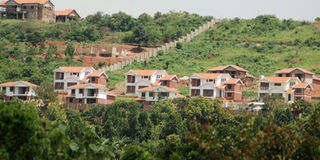Prime
The impact of Covid-19 on Uganda’s real estate industry

We believe that Ugandans still hold money to invest in property purchases. However, right now everyone holds onto what they have as a means of securing their future in case the situation gets worse, when all this is over, as businesses recover, we shall witness a gradual pick up on transactions. PHOTO BY ISMAIL KEZAALA
Covid-19 or as many expressly call it coronavirus, has proven beyond doubt that it is a global pandemic that World Health Organisation (WHO) declared a few months ago.
It is something that everyone is talking about globally. It has painted fear and panic among all people everywhere. With many questions like is it preventable? How fast is it spreading?
How dangerous is it? Will a treatment or even a cure be found in time?
This global quandary has not left the world economy the same. Some economic analysts have forecasted and almost reaching a conclusion that a global economic recession is a foregone conclusion.
To the players in the real estate industry, it is evident that in the past three months, the effects of the virus have been significantly seen overall for the Ugandan market, we discuss how this pandemic is affecting the industry
New property investments
In recent years, Uganda’s real estate sector witnessed a rapid growth in new investments into the sector as many investors both local and international have exhibited willingness to massively invest in new housing development of apartments, condominiums, villas and local investors taking on a huge portion of Land development.
According to Bank of Uganda, Uganda witnessed a credit advance from Banks into real estate up to a tune of Shs3.19 trillion in the year ending 2019.
However, because of Covid-19, this growth has been eminently attacked and a massive slack down is being witnessed ever since the outbreak of the pandemic. Before Uganda’s borders were closed, Uganda Investment Authority had already recorded a decline in the number of people coming to Uganda.
One of the investors in Uganda’s real estate sector, the Ruparelia group, closed two of its top Hotels, Speke resort and Commowealth Munyonyo, even before the country was put on a lockdown, this implied they would make less or no new investments in this period were they to continue operating, experts say. The vacancy rate in most commercial buildings is alarming in this season.
New purchases
It is evident that the immediate impact has been a severe drop in real estate transactions such as purchase of new homes, land, and new tenants moving into new business locations.
The situation becomes worse because it affects the income stream and return on investment
Developers say one of the biggest markets are men and women who left the country to go and work abroad in places like Dubai, Saudi Arabia, Qatar, Abu Dhabi etc.
The country is estimated to have a workforce of over 165,000 people in the Middle East remitting up to Shs2.4 trillion. Most of them send money here to buy land, build houses and invest in rental housing.
However, due to the pandemic, these economies have been hit, some of them were laid off and brought back home while those that stayed are on the verge of losing their jobs, and this inflicts on any new purchases.
As of today, Bank of Uganda has suspended all dividends and bonus payments, this will affect incomes of people that would be potential buyers of real estate.
Such similar cases have occurred elsewhere in the business sector where the income potential for most business people has been halted. If someone does not sufficiently earn, they cannot have the power to purchase real estate.
Something else that we have witnessed is that people have deliberately held on to the savings they have as a means of security in such a time as this.
If the country ever witnesses a reduction in lending rates by commercial banks and other banks that offer mortgages to people, we shall witness an increased desire by many Ugandans to borrow and acquire land because of the cheaper credit, which will in turn cause a spark in property prices because of an eminent increase in demand.
We could see high vacancy rates attack the retail sector because many business owners will not be able to pay rent due to decreasing business in almost all sectors. It is also understood that tenants in other commercial sectors have begun to negotiate on rents.
What lies ahead
Experts say, the likelihood of the sector waking up from its current slumber cannot be predicted with utmost certainty. However, the parameters, including the ability of potential clients to raise finances to purchase property is also unpredictable.
When Ugandans begin to work again, how fast will they be able to accumulate wealth to buy new property? How fast will other countries recover from the virus such that we witness open borders and probably allow our Ugandan people to go back to the Middle East and work, all this lies in a state of limbo.
Furthermore, fewer exports and fewer imports, especially from China reflect reduced incomes for potential buyers of real estate.
We believe that Ugandans still hold money to invest in property purchases. However, right now everyone holds onto what they have as a means of securing their future in case the situation gets worse, when all this is over, as businesses recover, we shall witness a gradual pick up on transactions.
We might also witness many foreclosures, banks sale of properties as the year moves forward. This is projected to be as a result of failure to pay loans and other credit obligations on property.
Mr Matovu is a lecturer of real estate and financial management, Makerere University Business School and managing, director Planet Estates Limited




